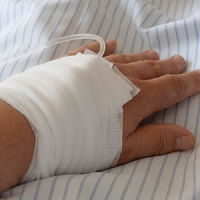A large international multicentre cohort study shows that most of the patients are underfed during their ICU stay. In their findings published in the journal Clinical Nutrition, researchers say most of the patients in intensive care are receiving the same amount of calories regardless of their condition, patient's well-being is not satisfied, and delayed nutrition is more frequent. The findings show poor adherence to nutritional guidelines.
From 2007 to 2013, a yearly one day cross sectional audit was performed to determine the nutrition practice in intensive care units and the associated outcome across the world. The data of this initiative called “nutritionDay ICU” were analysed by a team of researchers from Tel Aviv University (Israel) and Medical University Vienna (Austria).
For this study, a questionnaire translated in 17 languages was used to determine the unit's characteristics, patient's condition, nutrition condition and therapy as well as outcome. All the patients present in the morning of the one day prevalence study were included from 2007 to 2013.
Overall, 9,777 patients from 46 countries and 880 units were covered by the survey. Their SAPS 2 was median 38 (IQR 27-51), predicted mortality was 30.7% ± 26.9, and their SOFA score 4.5 ± 3.4 with median 4 (IQR 2-7). Administration of calories did not appear to be related to actual or ideal body weight within all BMI groups. Patients with a BMI <18.5 or >40 received slightly less calories than all other BMI groups.
Two thirds of the patients were either ventilated or were in the ICU for longer than 24 hours at nutritionDay. Feeding was through the oral, enteral and parenteral routes. More than 40% of the patients were not fed during the first day. The mean energy administered using enteral route was 1,286 ± 663 kcal/day and using parenteral nutrition 1,440 ± 652 kcal/day. Sixty days mortality was 26.0%.
Based on the results, most of the ICU patients are fed enterally, that enteral feeding is started after a median of one day and that the nutritional target is rarely reached, if ever after five days. "Most surprisingly there appears to be no adaptation of energy intake to body weight as it is generally recommended. This observation is found overall and in the patients that were already a week or longer in the ICU," the research team notes.
The study also suggests that recommendations and guidelines on proper nutrition for intensive care patients are failing to be implemented. "This may be explained by the fact that while early enteral nutrition is encouraged, intestinal failure as well as technical difficulties such as interruption for surgery or radiological procedures are frequently encountered, limiting the ability to achieve caloric goals," the team points out.
In addition, the researchers observed that there is a reluctance to use parenteral nutrition due to fear of infection complications risk. The study shows that only less than 15% of the studied population is receiving exclusive parenteral nutrition and less than 10% supplemental parenteral nutrition.
Source: Clinical Nutrition
Image Credit: U.S. Navy photo by Photographer's Mate 1st Class Shane T. McCoy
References:
Bendavid, Itai et al. (2017) NutritionDay ICU: A 7 year worldwide prevalence study of nutrition practice in intensive care. Clinical Nutrition. doi.org/10.1016/j.clnu.2016.07.012
Latest Articles
ICU, parenteral nutrition, delayed nutrition, supplemental parenteral nutrition
A large international multicentre cohort study shows that most of the patients are underfed during their ICU stay. In their findings published in the journal Clinical Nutrition, researchers say most of the patients in intensive care are receiving the same



























